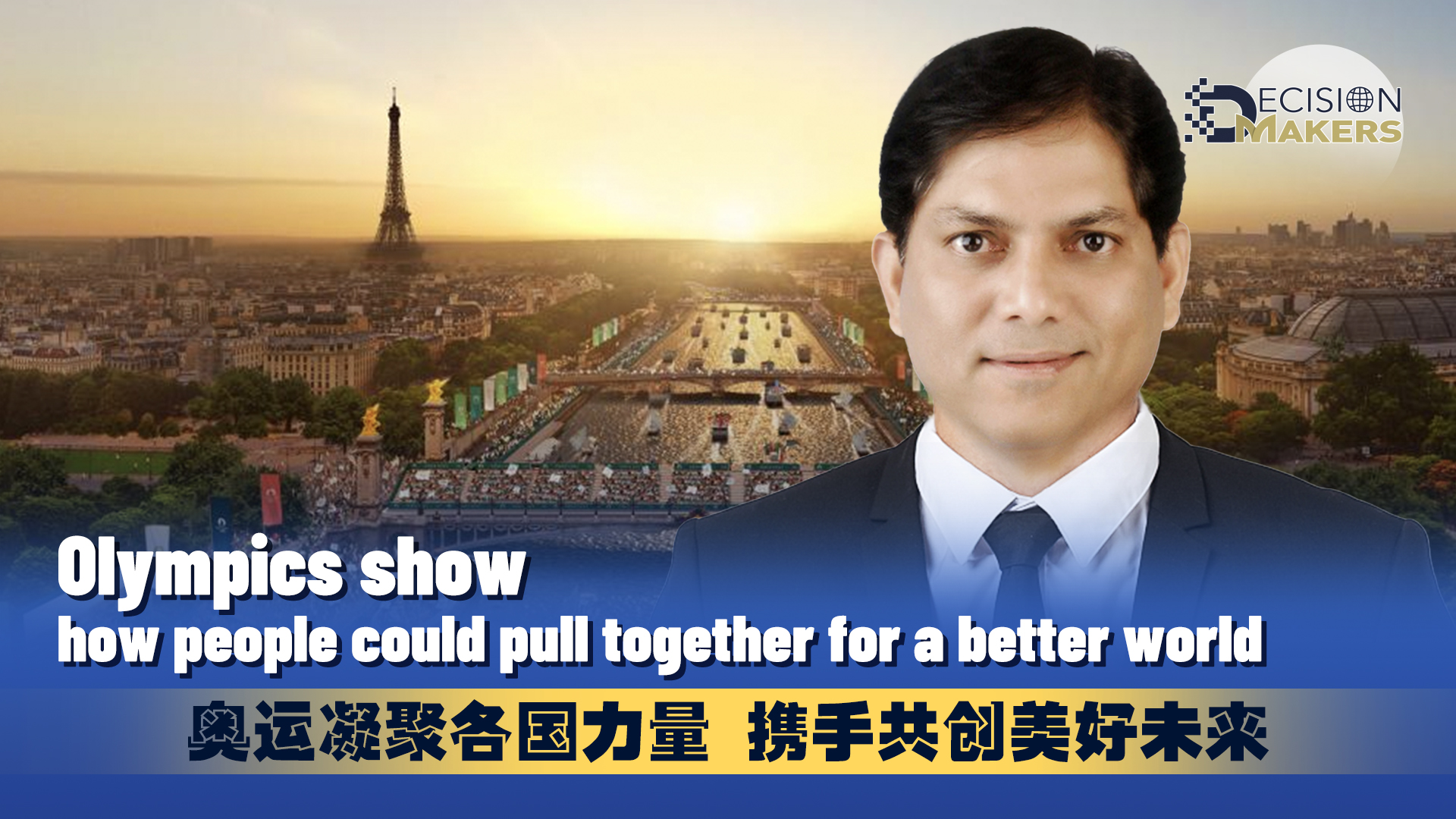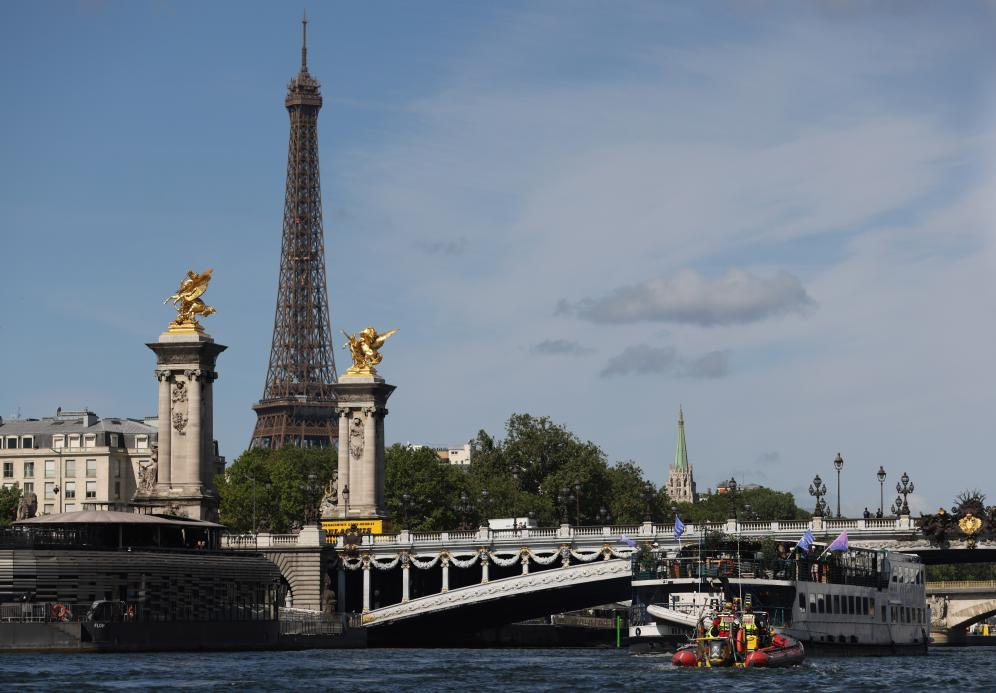
Editor's note: Decision Makers is a global platform for decision makers to share their insights on events shaping today's world.
By Vinod Kumar Tiwari
The Olympic Games has long since outgrown its original purpose to find the best athletes in the world. It is now a global celebration of humanity, hope and dreams, and peace and unity.
Sport in general, and the Olympic Games in particular, brings people together like no other gathering of leaders from around the world. Not at the government level, not in politics, not in religion, and not even in the United Nations.
Two examples of this can be witnessed at every Olympic Games: The athletes' village and the opening ceremony. Both are very much a part of the Games tradition but have nothing to do with elite competition or with gold, silver and bronze medals.
The athletes have been checking into the Olympic Village in Paris and all of them receive the same welcome and the same treatment, no matter whether they come from a big Olympic Games player such as China or Japan or from a smaller nation like Cambodia or Timor-Leste.
In the eyes of the Olympic Movement, they are all the same – and this philosophy makes everyone feel welcome and everyone feel on equal footing.
Personally, I love to visit the athletes' village at an Olympic Games. There is a buzz of excitement in the air as athletes come and go; a powerful sense of identity and pride as the delegations hang their national flag over the balcony of their apartment.
Even though they all have busy schedules, for training and competition, they always find time to stop for a chat with an athlete they have met previously, and happily take photos and swap contact details. These athletes become friends for life and can contribute to peace and understanding between countries in the future.
In Paris, for example, athletes from Palestine and Israel live side by side, as do athletes from Ukraine and from Russia and Belarus competing as Individual Neutral Athletes due to the war taking place in Ukraine.
Then we have Afghanistan. The rights of women and girls have been curtailed, particularly in relation to playing sports. Yet, thanks to the efforts of international sports organizations such as the International Olympic Committee and the Olympic Council of Asia (OCA), three Afghan women are representing their country in Paris, along with three men. This represents a remarkable victory for the global community and underlines the power of sport to unite the world.
Staying in the Olympic Village, another example of equality and respect is the team welcome ceremony. Every delegation – big or small – enjoys this short but meaningful ritual: A welcome message from the village mayor to mark the official arrival of the teams in the village, the playing of the national anthem and the raising of the national flag, an exchange of souvenirs and a photo op between the village mayor and the head of each delegation. All nations are welcome; all nations have a place.
The opening ceremony shows the true power of sport and the Olympic Games to bring the world together and contribute to the cohesion of the international community. Beijing 2008 Olympic Games was the perfect example, as the watching world was introduced to a vibrant, modern, dynamic China while, at the same time, being taken on a ride through the rich history of the vast country.
This year will see a very different ceremony, however, as the teams will not gather in the main stadium but join a flotilla of boats along the Seine River. Whatever the format of the parade of athletes, it serves to introduce every country or region to the world.

The parade on the River Seine to test "maneuvers," "distances," "duration" and "video capture" of the future opening ceremony of the Paris Olympics in 2024, July 17, 2023. [Photo/Xinhua]
Billions of TV viewers around the world see representatives of countries they have seldom heard of, often dressed in colorful eye-catching national costumes. This is a celebration of the world and of humanity on a grand scale; everyone together, everyone equal but special in their own way.
While the Olympic Village and opening ceremony make huge contributions to international cohesion, individual athletes can lift a nation and instill pride and respect at home and overseas.
Take the example of Hidilyn Diaz, a weightlifter from the Philippines, at the Tokyo Olympic Games. When Diaz won the Philippines' first gold medal in the history of the Olympic Games, going back to her country's first participation in 1924, the whole country was filled with pride, as were the millions of Filipinos working around the world.
The effects of her success could be seen throughout society, as her inspiring story inspired youngsters around the country to dream and aim high. This is the power of the Olympics in society, leaving a legacy for the country long after the gold medal presentation.
Sports fans around the world will marvel at the athletes, no matter where they come from. They will celebrate their success. They will share in the disappointment and frustration. They will remember the names of the heroes who will become legends.
Finally, I would like to wish every athlete a successful Olympic Games in Paris. You have worked hard to get there, made big sacrifices in your personal life over several years, and now have the stage on which to produce your peak performance.
As deputy director general of the OCA, I am confident that our Asian athletes will give a good account of themselves and bring pride and respect to their country and to the continent.
Vinod Kumar Tiwari is the deputy director general of the Olympic Council of Asia.

 中文
中文



